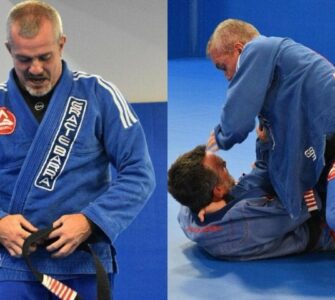Jiu-jitsu is an amazing sport. The physical and mental stimulation it provides is simply irreplaceable. Yet it takes quite a toll on the body. And regardless of your age and enthusiasm some precautions are more than necessary if you’d like to keep up the tempo of trainings.
Jiu-jitsu is overall fairly heavy on the body – it changes your body in a great way but along the way it can be quite heavy on the fingers, back, shoulders and knees.
Many of these injuries can be controlled and managed before they become big issues. This is why it’s always good to integrate plenty of stretching. Whether it’s warm ups or cool down after a hard session you should always stretch plenty.
Science has different views on different benefits and effects of stretching so the best universal advice is to find what works best for you and your schedule.
Some weight lifting is also quite handy. Not necessarily for the strength gains as much as for posture because a lot of injuries ultimately result from bad posture and allowing yourself certain positions that already stress out your organism prior to even including jiu-jitsu in the equation.
Technique relevant warm ups. Many times an academy will have a default stretch routine. This isn’t necessarily a bad thing but certainly preparation and an accent on the muscles you’ll be using heavily during the session helps.
It’s also quite important to let your body rest and recover. If you’re not getting enough sleep you’ll be just making things worse not to mention your concentration. Yes, we’ve all had sessions where we were essentially winging it, and showing up just to play around and try and relax but in order to make the most of it it’s important to include proper recovery into the equation.
Supplements can certainly help – especially if you already start exhibiting signs that your immune system is compromised. Some of the major signs that you might be overtraining your immune system into overdrive are:
- pinkeye
- sinus infections
- colds
- diarrhea
- pneumonia
- yeast infections
Of course there are plenty of milder symptoms such as:
- chronic fatigue
- allergies
- injuries that take too long to heal
Depending on your specific needs it’s good to pay attention and to adjust accordingly. While vitamin C doesn’t hurt, if you’re overtraining and especially if you’re in a milder climate your go-to should be vitamin D. “Suboptimal” vitamin D status is linked to increased risk for acute illness, inflammatory injury, stress fracture, muscle pain/weakness and suboptimal muscle performance. Athletes with a history of these issues may benefit from assessment of vitamin D status.egular consumption of vitamin D-containing foods alone is not likely to maintain sufficient vitamin D status. Sensible sun exposure (5 to 30 min of exposure to arms, legs and back at close to solar noon several times a week), regular vitamin D supplementation (1,500-2,000 IU/day), or a combination of dietary intake, sun exposure and supplementation are required to achieve sufficient status.

















